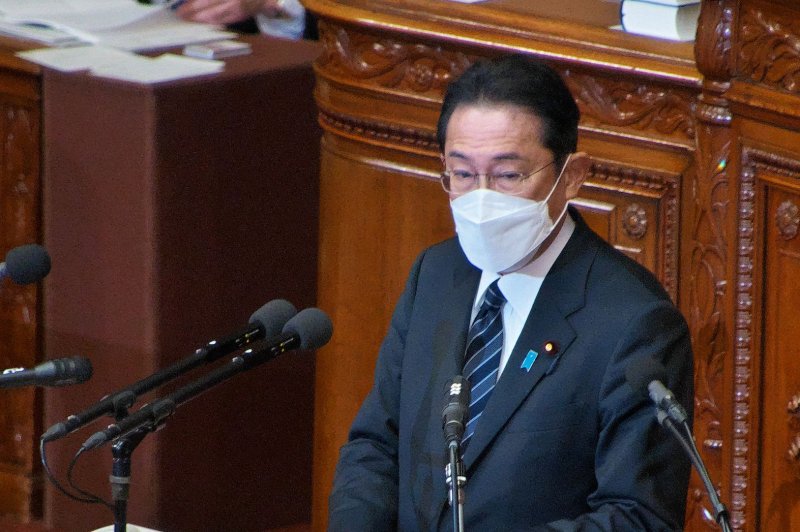Japanese Prime Minister Fumio Kishida on Monday rejected the idea of entering a nuclear sharing arrangement with the United States. File Photo by Keizo Mori/UPI |
License Photo
Feb. 28 (UPI) -- Japanese Prime Minister Fumio Kishida on Monday rejected the idea of hosting nuclear weapons from the United States as a deterrent amid rising global tensions from the Ukraine crisis.
"It is unacceptable given our country's stance of maintaining the three non-nuclear principles," Kishida said at a session in Japan's parliament Monday, according to news agency Kyodo.
The three principles, which were adopted as a parliamentary resolution in 1971, state that Japan will not possess, not produce and not permit the introduction of nuclear weapons.
Japan remains under the extended deterrence of Washington's nuclear umbrella.
Kishida was responding to a suggestion by former Prime Minister Shinzo Abe that Japan should start discussing a nuclear sharing agreement with the United States similar to arrangements among NATO countries.
"We should discuss various options, as far as how defending [Japan] and its people is concerned," Abe said Sunday on a TV program about the invasion of Ukraine by Russia, Asahi Shimbun reported.
Abe suggested that the fate of Ukraine may have been different if it hadn't given up its nuclear weapons in the 1990s.
"We should not regard a discussion on how the world's security is maintained as taboo," Abe said.
An estimated 100 U.S.-owned nuclear weapons are stored in five non-nuclear NATO member states -- Belgium, Germany, Italy, the Netherlands and Turkey -- according to the nonprofit Center for Arms Control and Non-Proliferation.
Russian President Vladimir Putin on Sunday ordered his country's deterrence forces, which include nuclear weapons, onto their highest state of alert, raising fears of a potential nuclear conflict.
Kishida, who is from Hiroshima, has long been an outspoken advocate for nuclear disarmament. As foreign minister, he helped arrange the 2016 visit by U.S. President Barack Obama to Hiroshima, where some 140,000 people were killed when the United States dropped an atomic bomb on Aug. 6, 1945.
Documents declassified in 2016 confirmed that the United States stored nuclear weapons in Okinawa during the Cold War.















